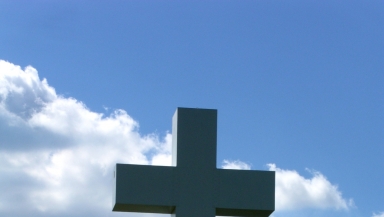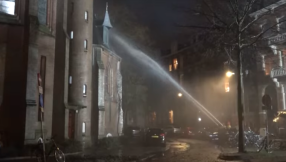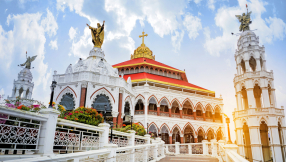
A new survey shows that a substantial majority of Americans would support generic, non-denominational prayers at governmental public meetings.
Fairleigh Dickinson University's PublicMind survey asked voters about the recent Supreme Court case of Greece vs Galloway, which is investigating whether prayers before meetings of elected officials are constitutional.
The poll revealed that 73 per cent supported the statement that "prayer at public meetings is fine as long as the public officials are not favouring some beliefs over others".
Peter Woolley, professor of political science at Fairleigh Dickinson in New Jersey told the Religion News Service: "Americans have become more used to the idea that one denomination is not necessarily privileged over another."
A substantial minority however still object to the presence of prayer of any kind. Almost a quarter of respondants, 23 per cent said that they felt "public meetings shouldn't have any prayers at all because prayers by definition suggest one belief or another".
Among those who attend religious services regularly, the number who supported the presence of prayer at public meetings jumped to 86 per cent, while the number of those opposing dropped to 11 per cent.
Those who attended religious services on a few occasions throughout the year were closer to the overall average of all respondents. Among this group, 73 per cent supported generic prayers, while the number opposing such prayers rose slightly to 26 per cent.
Those who reported that they either very rarely, or never go to religious services were the most divided in their position on this issue. Just over half - 58 per cent - supported pre-meeting prayers, while 36 per cent opposed them.
The case emerged when Susan Galloway, a Jew, and Linda Stephens, an atheist, filed a case against the town of Greece, New York, in which they argued that the Christian prayers before town meetings, a tradition going back to 1999, violated the First Amendment's separation of Church and State.
Although the prayers did not have to be Christian in nature, from 1999 to 2007 all prayers were conducted by a Christian leader. The prayers were also non-generic, mentioning Jesus's name specifically, rather than a more broad reference to 'God'.
The town's officials argued that they were not opposed to non-Christian prayer leaders, but that they drew their speakers from a list of local religious leaders provided by the Greece Chamber of Commerce, all of whom were Christians.
In their official brief, the town said: "To be sure, a majority of prayer-givers were Christian... But that fact does not support the conclusion that the Town exploited the prayer opportunity to proselytise or to advance or disparage any faith."
Ms Galloway and Ms Stephens disagreed, arguing that a particular religion was being supported by the state to the expense of all the others, and that the official's inaction in seeking out non-Christian prayer leaders was discriminatory.
An initial ruling supported the prayers as constitutional and non-sectarian, while a later appeals case in the 2nd Circuit Court of Appeals in May 2012 ruled against the prayers.
Judge Guido Calabresi, in delivering an opinion in the second ruling, said: "We conclude, on the record before us, that the town's prayer practice must be viewed as an endorsement of a particular religious viewpoint."
Previous Supreme Court rulings on similar matters have come down both in favour of public prayer at official meetings, as long as those involved are mostly adults.
In the 1983 case of Marsh vs Chambers, Nebraska state senator Ernie Chambers sued the state because he felt that public funding of state chaplains and prayers at the start of legislature meetings were unconstitutional, and represented an establishment of religion prohibited by the First Amendment.
However, in delivering a verdict, Supreme Court Chief Justice Warren Burger said: "To invoke divine guidance on a public body entrusted with making the laws is not, in these circumstances, a violation of the Establishment Clause; it is simply a tolerable acknowledgment of beliefs widely held among the people of this country."
While the 1992 case of Lee vs Weisman the Supreme Court concluded that schools could not invite religious leaders to deliver prayers at public functions, even if the prayers did not reference a specific denomination, that case did specify that their ruling did not necessarily apply to situations where most of those attending would be adults.
Associate Justice Anthony Kennedy said: "What to most believers may seem nothing more than a reasonable request that the nonbeliever respect their religious practices, in a school context may appear to the nonbeliever or dissenter to be an attempt to employ the machinery of the State to enforce a religious orthodoxy.
"We do not address whether that choice is acceptable if the affected citizens are mature adults, but we think the State may not, consistent with the Establishment Clause, place primary and secondary school children in this position."
A Supreme Court ruling on this case is expected in the case of Greece vs Galloway by the end of June 2014.













